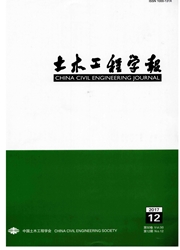

 中文摘要:
中文摘要:
结构可靠度分析的传统响应面法和随机响应面法都属于标量型响应面法,为克服其局限性,利用预处理Krylov子空间法研究建立了结构可靠度分析的向量型层递响应面法。首先将随机刚度矩阵和节点荷载向量线性展开,通过选取合适的预处理器建立了预处理Krylov子空间及层递基向量,据此将随机节点位移向量进行层递展开,形成向量型的层递响应面。进而,利用混沌多项式展开层递基向量和层递响应面,根据混沌多项式确定层递响应面的样本点选取方法。在此基础上,根据可靠指标的几何含义,利用响应量的层递展开式建立了结构可靠度分析的迭代算法。算例分析表明,该方法与传统响应面法或随机响应面法相比,能够取得更高的计算效率和计算精度。
 英文摘要:
英文摘要:
Both the traditional response surface method (TRSM) and the stochastic response surface method (SRSM) for structural reliability are for scalar random variables at a given point of interested domain. This paper presents a vectorial type of cooperative response surface method (CRSM) to obtain structural reliability index. The linear expansions are presented for stiffness matrix and the nodal force vector. A suitable preconditioner is defined so that a set of hierarchical basis vectors are developed, with which a preconditioned Krylov subspace is expanded. The nodal displacement vector is approximated using the hierarchical basis vectors so as to define a cooperative response surface model. The sample points are determined in term of one-dimensional Hermite polynomials. Examples show that the proposed method is of high accuracy, global applicability and fast convergence.
 同期刊论文项目
同期刊论文项目
 同项目期刊论文
同项目期刊论文
 P-ΔEffect on probabilistic ductility demand and cumulative dissipated energy of hysteretic system un
P-ΔEffect on probabilistic ductility demand and cumulative dissipated energy of hysteretic system un Homogeneous generalized yield criterion based elastic modulus reduction method for limit analysis of
Homogeneous generalized yield criterion based elastic modulus reduction method for limit analysis of 期刊信息
期刊信息
